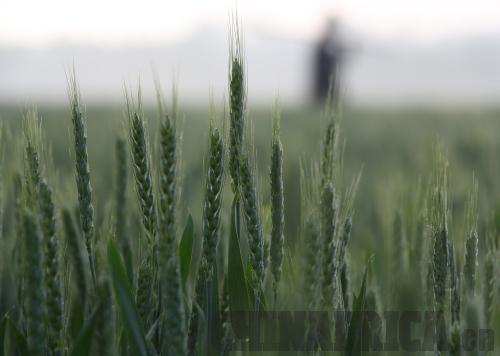| 
Chinese scientists, along with their American partners, have made key discoveries in wheat genes that will help improve the yield and extreme weather resistance of the crops. The scientists published the sequencing and drafting of the A genome of bread wheat (Triticum aestivum) in Nature magazine in March. Their research will undoubtedly be helpful to people in both China and Sub-Saharan Africa, where there are growing demands for wheat.
The researchers have presented the generation, assembly and analysis of the sequence of the A genome, one of the three basic genomes of bread wheat, which will help scientists and agricultural experts all over the world to better understand bread wheat. The complexity of the wheat genome has made it difficult for agricultural scientists to modify and improve the crop, but the new findings and identification of around 38,000 wheat genes will give scientists valuable insight on the genetic makeup and evolution of bread wheat.
The Chinese team of scientists comes from the Institute of Genetics and Development Biology under the Chinese Academy of Sciences (CAS) and BGI, a genomics organization based in Shenzhen, south China's Guangdong Province. The Chinese scientists worked with American scientists from University of California, Davis. The team's research on bread wheat is vital because the crop feeds about 40 percent of the world's population. The research will help to improve the quality of bread wheat by making way for genetic diversity, higher crop yields and resistance to drought, blight and cold weather.
China and several African countries are in great need of increased wheat production. In April, China imported wheat for its state reserves for the first time in nearly a decade. Much of China's stockpiles of wheat from the past couple of years have deteriorated because of substandard storage facilities, and now the country needs to replenish its reserves. China has had to import huge amounts of wheat in the past; in 2004 and 2005, China bought about 10 million tons of wheat because of a poor harvest from the previous year.
Though last year's harvest in China brought the country 120.58 million tons of wheat, the second highest on record, experts predict this year will not be as successful due to droughts in Henan, Sichuan and Shaanxi provinces. Wheat crops in China depend heavily on weather conditions and with the scientists' new discoveries on wheat genomes, farmers can hope for a better future that eventually brings hardier crops.
Africa's problem is more severe. Throughout the continent, countries import and consume tremendous amounts of wheat without growing it. Last year, the first Wheat for Food Security conference took place in Addis Ababa to address this very problem. According to the Scientific American magazine, Sudan produces a fifth of the amount of wheat it consumes. This means that the country imports over 1.7 million tons of wheat for breads and pastas, among other food items.
According to the National Institute for Agricultural Research in Tunisia, North Africa imports half of the global wheat trade, and in total, African countries imported about $12 billion worth of wheat last year. Agricultural analysts say that it is possible for African countries to become self-sufficient, particularly in Sub-Saharan Africa, where the soil is more suitable for wheat crops. However, farmers still face problems of drought and extreme heat and few biotechnology tools. But with the new wheat genome discoveries, it is possible to foresee a future with high-yield, heat and cold-resistant crops in which both China and Africa may depend on their own farmers to feed their people and livestock. CA
Tech Bytes
» China Mobile users in Shanghai will rejoice in June as the company rolls out large-scale trials of 4G Internet services. The 4G networks will provide Internet service 20 to 50 times faster than that of 3G, and China Mobile's Shanghai branch will allow 5,000 of its customers to try out this new service. |